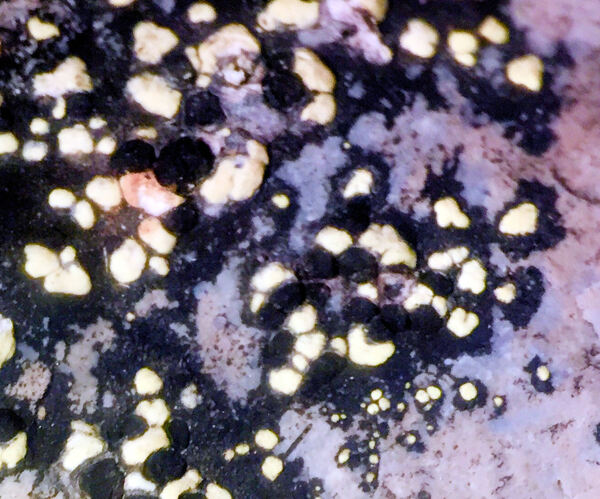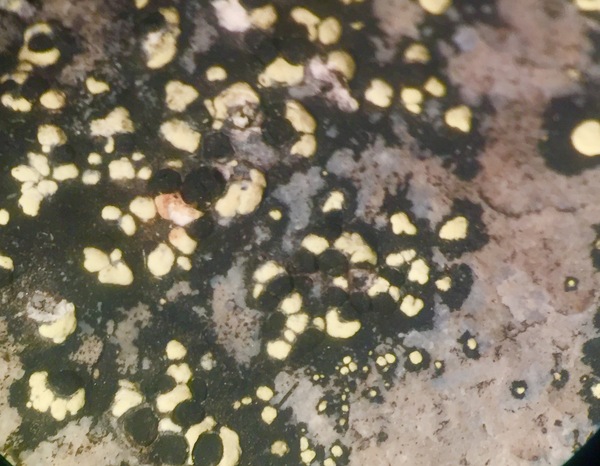Rhizocarpon geographicum subsp. arcticum (Runemark) Hertel
in Hertel & Ullrich, Mitt. bot. Staatss. München, 12: 483, 1976. Basionym: Rhizocarpon tinei subsp. arcticum Runemark - Opera Bot., 2: 125, 1956.
Synonyms:
Distribution: N - TAA (Nascimbene & al. 2022), VA (Piervittori & Isocrono 1999).
Description: Thallus crustose, episubstratic, whitish yellow-green, 0.2-0.6 mm thick, areolate, forming up to 5 cm wide patches delimited by a black prothallus, the areoles more or less angular, (0.2-)0.4-1(-1.3) mm wide, flat to convex, smooth, not subdivided by cracks, contiguous or often dispersed on a black hypothallus. Cortex without a distinct structure, with abundant small crystals insoluble in K; medulla white, I+ blue. Apothecia frequent, lecideine, arising between the areoles and often surrounded by collar-like areoles, rounded, 0.5-1 mm across, with a black, weakly concave to weakly convex, epruinose disc and a very thin, often indistinct, black proper margin. Proper exciple pale brown to brownish red; epithecium brown, K+ purple-red; hymenium 100-150 µm thick, colourless to greenish, K/I+ blue, K+ greenish; paraphysoids strongly coherent, richly branched and anastomosing, the apical cells sometimes slightly capitate; hypothecium dark brown, K-. Asci 8-spored, clavate, fissitunicate, with a well-developed tholus that is K/I- in lower part and K/I+ blue near the apex, lacking an ocular chamber, Rhizocarpon-type. Ascospores submuriform to weakly muriform, with 6-10(-13) cells visible in optical view, soon becoming dark green to brown, ellipsoid, 22-30 x 17-19(-20) µm, halonate at least when young. Photobiont chlorococcoid. Spot tests: medulla K-, C-, KC-, P- or P+ yellow. Chemistry: cortex with rhizocarpic aci, medulla without lichen substances or with psoromic acid. Note: an arctic-alpine lichen found on siliceous, exposed rocks, restricted to the nival belt of the Alps.
Growth form: Crustose
Substrata: rocks
Photobiont: green algae other than Trentepohlia
Reproductive strategy: mainly sexual
Commonnes-rarity: (info)
Alpine belt: very rare
Subalpine belt: absent
Oromediterranean belt: absent
Montane belt: absent
Submediterranean belt: absent
Padanian area: absent
Humid submediterranean belt: absent
Humid mediterranean belt: absent
Dry mediterranean belt: absent

Predictive model
Herbarium samples
Growth form: Crustose
Substrata: rocks
Photobiont: green algae other than Trentepohlia
Reproductive strategy: mainly sexual
Commonnes-rarity: (info)
Alpine belt: very rare
Subalpine belt: absent
Oromediterranean belt: absent
Montane belt: absent
Submediterranean belt: absent
Padanian area: absent
Humid submediterranean belt: absent
Humid mediterranean belt: absent
Dry mediterranean belt: absent

Predictive model
| Herbarium samples |
 INDEX FUNGORUM
INDEX FUNGORUM
 GBIF
GBIF
 DOLICHENS
DOLICHENS




